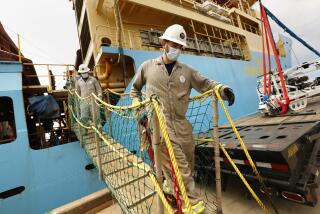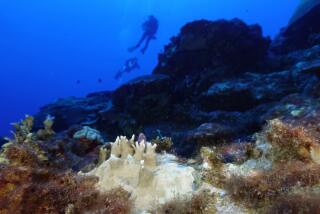Richard Branson and James Cameron want to save the high seas
We share a deep and abiding passion for and fascination with the ocean that has led us since childhood to wander the world under the waves. We also share an increasing concern that the health of the ocean is rapidly deteriorating under the strain of human pressure and neglect. The evidence is everywhere, from plastic waste at the bottom of the Arctic Ocean to flattened remains of deep ocean reefs hundreds of miles from land, bulldozed by bottom trawlers. No part of the ocean, no matter how deep or remote, is safe anymore.
At particular risk are international waters that lie beyond the jurisdiction of any country, known as the high seas. This vast realm constitutes two-thirds of the oceans and covers nearly half the planet’s surface, and harbors the largest remaining reservoir of unexplored biodiversity left on Earth. Yet these waters face escalating pressure from overfishing, deep seabed mining, ocean acidification, chemical and noise pollution, huge gyres of plastic waste, dead zones, ship traffic and destructive fishing tactics such as bottom trawling.
Like most commons, the high seas are poorly regulated. Environmental controls on mining, fishing, pollution and shipping are inconsistent, weak or altogether absent. There are no uniform requirements to assess and manage industrial activities, no mandate for modern, ecosystem-based management, and no mechanisms to create marine refuges where sea life can live undisturbed.
In the controlled waters of the United States and other nations, governments have set aside reserves for ocean life. In contrast, less than one-three-hundredth of 1% of the high seas has been protected. Scientists believe that such protected areas are essential for ocean health and global resilience in the face of increasing human pressures.
An important opportunity to begin responsibly managing half the planet lies before us. The United Nations will hold meetings this week to discuss the future of the high seas. Led by Brazil, the European Union, Argentina, Mexico, Monaco and others, a coalition of developed and developing nations has proposed an international agreement to modernize governance of the high seas.
The agreement would provide for high seas protected areas, and require countries proposing to engage in destructive activities to assess and manage their effects. It would also deal with the lack of any rules governing how revenue derived from developing genetic resources in international waters will be shared, an important bar to commercializing new products derived from international waters. Most important, such an agreement would begin to bring to the high seas modern management as practiced in the U.S. and elsewhere since the 1970s. Such an agreement has been discussed and debated for years at the United Nations. It is time to move beyond words to action and begin negotiations.
The United States has been the single most significant obstacle to a new high seas agreement, with the State Department citing potential opposition from members of Congress who are critics of the United Nations. Possible opposition from pharmaceutical, biotech and/or cosmetics companies involved in marine genetic research has also been mentioned, although no such opposition has surfaced in the more than six years these issues have been widely discussed.
We do not believe it makes sense to hold this hugely important ocean conservation initiative hostage to possible opposition in the Senate or unspecified potential concerns by unnamed interests. This is not leadership.
Spearheading negotiations on the conservation and management of the high seas could give the U.S. a big win on a global issue. It would level the playing field by making sure that activities on the high seas are subject to the same kinds of requirements routinely imposed on ocean industries in U.S. coastal waters. Such an agreement would also provide predictability and certainty to companies that take risks to develop commercial products from genetic resources sourced from marine areas beyond national jurisdiction.
How many chances does a president get to influence the future of half the planet for the benefit of all that live on it? That opportunity is here. We urge President Obama and Secretary of State John F. Kerry to seize it, at this critical moment, by joining the call for a new agreement to protect the high seas.
Richard Branson is founder and chairman of Virgin Group. James Cameron is a film director, producer and deep-sea explorer.
More to Read
A cure for the common opinion
Get thought-provoking perspectives with our weekly newsletter.
You may occasionally receive promotional content from the Los Angeles Times.









